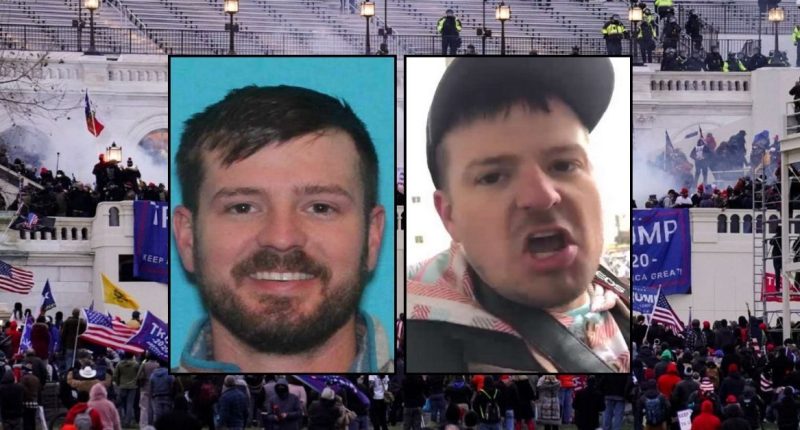
Insets: Ryan Zink (Department of Justice). Background: FILE — Violent rioters loyal to President Donald Trump storm the Capitol in Washington on Jan. 6, 2021. (AP Photo/John Minchillo, File).
A Jan. 6 defendant from Texas who ran for Congress last year and is reportedly attempting another political run has been granted permission to “examine and publish” footage, evidence and discovery from his criminal case surrounding the events of the 2021 Capitol attack — but the Justice Department says not so fast.
Ryan Zink, 35, of Lubbock, was granted access last week by U.S. District Judge James Boasberg on account of the DOJ not filing a memorandum in opposition to Zink’s March 22 motion to lift a protective order keeping his case material sealed. Boasberg issued a minute order on April 9 announcing his decision, which the DOJ apparently saw and responded to Wednesday with the document in question.
“As the Government has not opposed Defendant’s Motion to Lift Protective Order, the Court orders that the Motion is granted, and the Protective Order is lifted,” a docket entry from Boasberg said last week.
In response, the DOJ’s top prosecutor in Washington, D.C., Ed Martin, signed off on a memorandum in opposition Wednesday that said granting such a request to Zink would put people at risk and pose a threat to national security.
“Lifting a protective order in this case creates a dangerous opportunity and could potentially place sensitive information in the possession of those who would use it to harm the national security, in addition to allowing terabytes of information including individual defendants’, witnesses’, and victims’ personal identifying information to be released to the public,” Martin said. “The government has thus demonstrated that release of these materials could cause a significant hazard to others, and there is no prejudice to the defendant from continuing the protective order here.”
Zink, who was defeated in the Republican primary last year, is reportedly running for a seat in Texas’ 19th District. He was found guilty in the District of Columbia back in 2023 of three charges related to Jan. 6, including one felony and two misdemeanor offenses.
“While on restricted grounds immediately outside the Capitol building, Zink filmed a series of video clips,” the DOJ said in a press release announcing his conviction.
“In one clip, the defendant recorded himself stating, ‘We knocked down the gates! We’re storming the Capitol! You can’t stop us!”” the DOJ said. “In the same video, Zink panned the phone camera to show the crowd around him and later began chanting, ‘We want Trump!’ as he moved through the crowd at the footsteps of the Capitol.”
Zink was caught on video and audio saying several different things that were brought up by DOJ prosecutors in his case file.
“You all want to know how it’s going? We are going to bum rush this s—!” he allegedly said in one clip.
“In a second video, the defendant filmed the crowd as it attempted to breach the Rotunda Doors to the Capitol,” the DOJ alleged. “Zink stated, ‘They’re not going to get this one.’”
In a third video, the DOJ said Zink shouted, “You wanted to see what it’s become? We’re in the doors!” Toward the end, he allegedly turned the camera to capture another individual smashing out a window near the Rotunda Doors.
“Broke down the doors,” Zink later allegedly wrote in text messages obtained by the DOJ. “Pushed Congress out of session … I’ll be posting pictures in a little bit when we get back … we accomplished the job,” Zink said.
He allegedly added, “I’m afraid the time for rioting is over better clean those guns and invest in some level 4 armor.”
Martin said Wednesday in the government’s opposition filing that since Zink has been pardoned by President Donald Trump, like other Jan. 6 defendants, “there is no need for further discovery, and the defendant does not have any First Amendment right to the discovery provided to him.”
More Law&Crime coverage: ‘Entitled to reimbursement’: Trump DOJ says Jan. 6 defendants deserve to get restitution refunds after having cases ‘invalidated’
Martin claimed the protective order “continues to operate to protect information that is vital to national security” and “significantly affects the privacy rights of victims and witnesses, even after the conclusion of the investigation and prosecution,” per the filing.
“The defendant has cited no authority or rationale to release this volume of material, protected by these orders in hundreds of similar cases, in such a wholesale fashion, where this material is no longer necessary to his defense and could cause such damage to the national security and rights of third parties, including witnesses and victims,” Martin said.
“The defendant’s argument that the government should make its discovery databases available to the public fails to address the vast amount of information that has already been made public through the government’s investigations and prosecutions of these cases,” Martin added. “The events of January 6, and the ensuing investigations and prosecutions, are important to our history as a nation — events that must be considered through appropriate public access to government records and through public discourse. But criminal discovery is not the appropriate mechanism to vindicate that interest.”
Martin accused Zink of trying to “abuse the discovery process,” even though his counsel was given access to the materials in question while defending him.
“The defendant has no further right to, nor need of, the discovery in this matter,” Martin concluded. “The Court should deny the defendant’s motion.”
Zink’s attorney, Roger Roots, argued in their motion that he and other defendants — along with journalists, researchers and the public as a whole — have a right to examine and publish the footage, evidence and discovery that’s in question.
“The vast majority — perhaps almost the entirety — of camera footage, film and photos collected in these discovery databases do not concern any locations of the Capitol which are off-limits to the public,” the motion said. “Indeed millions of tourists have seen and been in the hallways and areas.”
Roots claimed that the public and press have a “presumptive First Amendment right of access” to judicial proceedings in criminal cases, which gives Zink the ability to make such a request.
“The roots of public access to court proceedings and records lie in ‘democratic values of accountability and openness,’” the motion said. “Few cases could be more crucial for publication of all court files and records than Zink’s case, and January 6 cases in general. January 6 cases are famously political, and President Trump has called the prosecutions a “grave national injustice.” Accordingly, the public’s interest is even more accentuated than in other types of cases.”
Love true crime? Sign up for our newsletter, The Law&Crime Docket, to get the latest real-life crime stories delivered right to your inbox.




